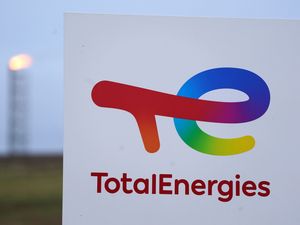TotalEnergies advert banned for misleading over environmental impact
Adfree cities complained that the ad about wind energy projects failed to mention that the firm’s operations remained mostly based in fossil fuels.

An advert for French oil and gas giant TotalEnergies has been banned in the UK for misleading consumers over the firm’s environmental impact.
Campaign group Adfree cities complained that the paid-for X post in May focused on the firm’s renewable wind energy projects while failing to mention that its operations remained mostly based in fossil fuels.
TotalEnergies said it could not include more information about its business practices within the ad due to the constraints of the medium, but its website made clear that it was involved in oil and gas.
However the Advertising Standards Authority (ASA) ruled that the advert, which focused on one of the TotalEnergies’ lower-carbon initiatives, framed it as reflective of its current business activity.
The TotalEnergies’ Sustainability and Climate 2024 report stated that in 2023, 90% of its sales arose from petroleum and gas products, while it was responsible for 1.5% of global oil production and had allocated 68.3% of its capital expenditure towards fossil fuel energies and 31.7% to lower-carbon activities.
The ASA said it was therefore likely to mislead as it had not included information about the proportion of TotalEnergies’ overall business model that comprised lower-carbon energy products.
Alongside the ruling, the ASA did not uphold 76 complaints that an advert for Shell gave a misleading impression of its environmental impact, or one complaint that an ad for Barclays bank was misleading for omitting significant information about its contribution to carbon dioxide and greenhouse gas emissions.
In the case of Shell, a TV ad featured an engineer walking past electric vehicle charging points, an offshore gas rig and a family kitchen before superimposed text detailed the proportion of the energy giant’s investments in fossil fuels and lower carbon technologies.
The ASA said the advert made it clear to consumers that the majority of Shell’s investments were in oil and gas and therefore did not give a misleading overall impression of its environmental impact.
The rulings are part of the ASA’s ongoing Climate Change and Environment project which aims to shine a greater regulatory spotlight on green claims used in advertising.
However Adfree Cities, which made complaints against both ads, said the ASA’s refusal to ban the Shell advert was “endorsing greenwash”.
Veronica Wignall, co-director at Adfree Cities, said: “Any advert that portrays Shell as prioritising the environment in any way is categorically misleading while the oil major continues to expand its fossil fuel operations, directly undermining a clean energy transition.
“With this ruling the ASA is essentially endorsing greenwash, marking a systemic and ongoing failure to protect consumers from fossil fuel misinformation.”
A spokesman for Shell said: “We are pleased that following an investigation, the ASA has ruled that our advert complied with their code.
“Our campaign shows how Shell is powering progress in the UK, now and into the future and we’ll continue to produce ads which are clear and compelling.”





